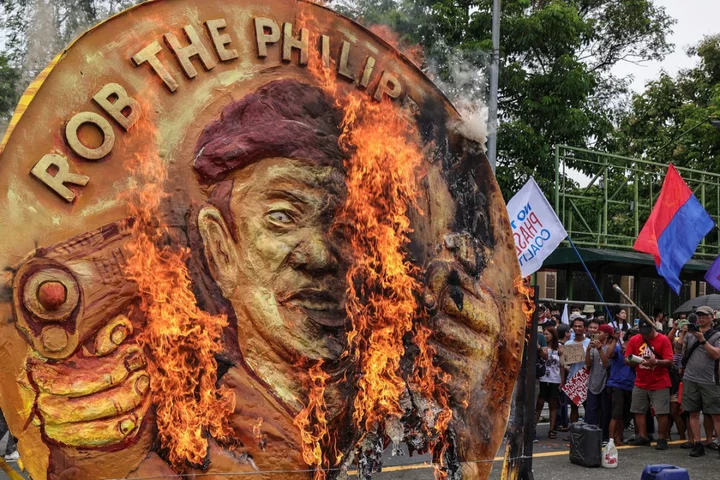Philippine President Ferdinand Marcos Jr. was to deliver a state-of-the-nation speech Monday after his first year in office, which saw him allow an expanded U.S. military presence and refuse to rejoin the International Criminal Court in a move aligned with his predecessor, whose bloody anti-drugs crackdown was under an ICC investigation.
More than 20,000 police, backed by other security forces and army troops, were deployed to keep order amid protests and secure the House of Representatives, where Marcos will deliver his speech before a joint session of Congress.
Marcos, 65, rose to power in June last year in a landslide victory that was among the most dramatic political comebacks in recent history. His father was ousted as a dictator accused of widespread human rights violations and plunder in a 1986 pro-democracy uprising that became a harbinger of change at the time in authoritarian regimes worldwide. The president has refused to apologize and has steadfastly defended his father’s legacy.
Marcos told reporters last week that his speech would be “a performance report for Filipinos to see if the flurry of pronouncements, the many words, had an impact or were just mere words."
"That's what I want to explain to people — that we have made significant progress. We can see the difference now not only in terms of how the systems work, how the government works. It is also in how we are now seen or judged in the international community,” Marcos said.
He was expected to press his campaign call for national unity, although deep divisions remain.
About 6,000 left-wing, labor and human rights groups staged protests ahead of his speech in Congress with diverse demands, including for wage increases, to address attacks against political activists and journalists, and to recall a government program to phase out traditional but aging passenger jeepneys. A group of drivers began a three-day strike on Monday to protest the jeepney phaseout, but no major transport paralysis was reported by midday, police said.
Marcos approved the suspension of school classes and government work in metropolitan Manila on Monday due to the planned transport strike and an approaching typhoon.
Despite a police restriction on the burning of effigies, left-wing activists burned a mock giant coin that depicted a smiling Marcos flashing the peace sign with his fingers on one side and as a thief holding a gun and bag of cash in the other.
Pro-Marcos groups separately held a musical concert and displayed congratulatory streamers.
Since assuming the presidency, Marcos has embarked on more than a dozen foreign trips, including to the United States and China, to seek investments and boost trade. He was scheduled to leave for Malaysia on Tuesday for a three-day visit.
The government said the foreign trips are crucial to drum up economic reforms and initiatives, including a bill that Marcos signed into law last week creating the country’s first sovereign wealth fund, which aims to pool money for infrastructure and other projects. But opponents said the trips, including one that brought him to Singapore to watch Formula One races in October, reflected the president’s misplaced priorities given problems at home, including soaring food prices early in his presidency.
Marcos made himself agriculture chief to directly deal with what he said last year was a looming food crisis caused in part by the war in Ukraine. He has held the post until now despite calls for him to appoint another official so he can focus on other concerns.
In February, Marcos approved an expansion of the U.S. military presence in the Philippines to add four new bases from five existing sites under the 2014 Enhanced Defense Cooperation Agreement between the longtime treaty allies. The move, which Marcos said would help boost the Philippines’ coastal defense, dovetails with the Biden administration’s efforts to strengthen an arc of military alliances in the Indo-Pacific to better counter China.
China warned the move “will drag the Philippines into the abyss of geopolitical strife and damage its economic development at the end of the day.” But Philippine officials said the move was not aimed at China.
Marcos's moves to reaffirm ties with Washington was a key turnaround from the often-hostile approach his predecessor, Rodrigo Duterte, took toward Manila’s treaty ally.
In a decision that clearly favored Duterte but came under attack from human rights activists and Marcos' opposition, he refused to take steps to bring the Philippines back to the ICC and said his administration would not cooperate with its investigation into thousands of killings under Duterte’s campaign against illegal drugs.
Duterte withdrew the Philippines from The Hague-based court in 2019 in a move rights activists said was an attempt to evade accountability and prevent an international probe into the killings in his anti-drugs crackdown. The ICC, however, has jurisdiction over alleged crimes committed when the Philippines was still a member state of the court.
Read MoreUkraine war’s heaviest fight rages in east - follow live
Charity boss speaks out over ‘traumatic’ encounter with royal aide
Gunman who killed co-workers at New Zealand building site died from self-inflicted wound, police say
Moscow, Crimea hit by drones as Russian forces bombard Ukraine's south
Macron promotes French interests on a trip to South Pacific where US-China rivalry is intensifying

